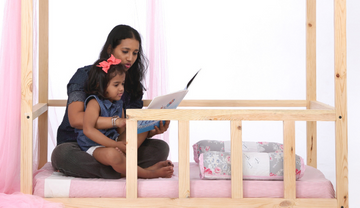(Author Ms.Nithya Ramachandran - Montessori Guide and Consultant)
Stories hold a very special place in our lives, whether they be in the form of physical books, movies, Instagram reels, OTT series, podcasts, audiobooks or simply talking with others about their lives. No matter the form, the captivating power of the narrative binds us universally as humans. But the stories that are perhaps the most treasured are those we were told by our grandparents or parents, sitting in their lap or lying down next to them before bedtime.

The stories we listened to during childhood, which were narrated to us orally, without any fancy props or illustrations but which were told just for us, modified to include our favorite things, and repeated multiple times, the ones we knew by heart, are those that stay closest to our hearts. With the onset of screens, somewhere along the way, we seem to have forgotten the power of telling our children oral stories.
Oral storytelling has myriad benefits for young children – especially babies and toddlers who are in the receptive stage of language development. The Absorbent mind of the child under 3 is intensely attracted to oral language and hungry to take it all in. Here are a few reasons why you should include oral stories in your everyday routine.
- Oral storytelling develops listening skills and helps children focus on one thing at a time. Unlike books where they may have to look at different aspects like the illustrations, words and the narration, oral storytelling lets them focus just on the storyteller and their voice.
- When children listen to stories, they make up their own versions of the characters and setting in their mind. This helps to kindle their imagination and creativity. Children who grow up listening to stories often develop storytelling and story writing skills as they get older.
- Oral stories can be customized to a particular child or a group of children and the pace of the story, the complexity and the content can all be varied to suit the audience. Children can relate to these stories well as they have a bond with the storyteller and the story.
- Oral stories can be told in any language and the same story can be told in multiple languages, thus increasing the child’s exposure and experience with them.
- Stories can be great conversation starters – a small detail in the story can lead to discussions around various topics and offer opportunities to ask and answer questions.

What stories kind of stories can we tell babies and toddlers?
The stories you tell toddlers don’t need to have elaborate plots or twists. Routine and everyday life – going to the market, school or park can be told as stories.
You can also make up simple stories about real life with a basic problem and solution – try not to add too many details or fantastical elements.
You can also tell stories about important events like birthdays, weddings, trips or vacations taken together – stories about these events can be told both before they happen (to prepare your child for them) and after they happen.
Try to resist the urge to tell ‘moral’ stories or ‘teach’ your child lessons through stories – they are too young for this and are likely to miss the whole point.
Although as parents we may not be used to telling oral stories and might therefore hesitate to begin and prefer to take the help of books, remember that children don’t judge. They are happy to listen to any story that you tell and the more you enjoy telling the story, the more they will enjoy listening to you. Build oral storytelling into your everyday routine and remember to have fun with it.






